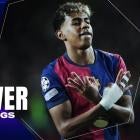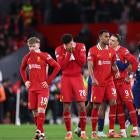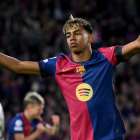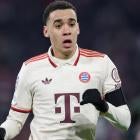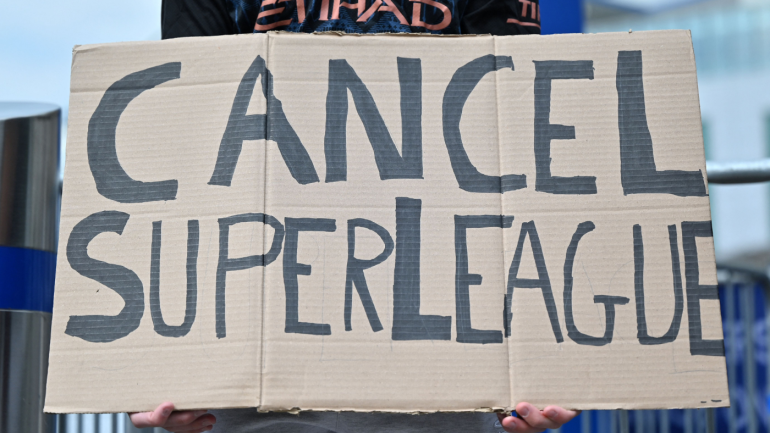
The Super League was a disastrous threat to football as we know it, a cynical land grab from those at the top of the game (and Arsenal and Tottenham, a joke that cannot be made often enough) to ensure their hegemony could never be challenged again. But, as the grand plans of European football's mega clubs came collapsing down upon them you could not help but also think: this is very funny.
Billionaires laid low by hubris, their grand plan destroyed in less time than it takes Jose Mourinho to turn on a dressing room and the trump card in all negotiations proving them to be nothing more than jokers. Let's reflect on some of the most embarrassing moments for the breakaway clubs.
5. Wolves claim the league title
While in private the other clubs in the Premier League, Serie A and La Liga were incandescent with rage there was something rather wonderful about the public face they projected, an intermingling of disdain and merriment at the expense of the breakaway teams. Leeds United's social media team hit the nail on the head quite exquisitely after their 1-1 draw with Liverpool at Elland Road, labelling their opponents "Super League side Merseyside Reds".
The tweet glistened with derision but even that could not compare with Wolverhampton Wanderers declaring themselves champions of the 2018-19 Premier League season, a campaign where only the 'big six' had finished ahead of them.
It's probably too late for a parade 🏆🥳 pic.twitter.com/qEc24zBb7l
— Wolves (@Wolves) April 20, 2021
Were they not so busy scrambling to keep their project alive there might have been something uniquely demeaning for the likes of Andrea Agnelli and Ed Woodward if they opened up Twitter on Monday and Tuesday to see every brand that wanted to score a few quick retweets dunking on the Super League for engagement.
Dominos' launching a pizza covered in greed and betrayal. Amazon expressing concerns about the monopolistic tendencies of your competition. A football fan from north London could scarcely open his phone without seeing his local team being dunked on. Cynical power grabs may not make for the most edifying of spectacles in the globe's sport but they indisputably bring out the best posts.
Craving even more coverage of the world's game? Listen below and follow ¡Qué Golazo! A Daily CBS Soccer Podcast where we take you beyond the pitch and around the globe for commentary, previews, recaps and more.
4. The on pitch results
If there was much amusement to be had online at the breakaway clubs it paled in comparison to the consistent humblings meted out on the field. The backlash was swift and immediate, a humbling of the biggest names that also stood as a testament to the value of the league competition the 12 were so willing to ravage on their departure.
Whether the players of Getafe, Fulham and Atalanta were aware of Real Madrid, Arsenal and Juventus' plans on Sunday we do not know but each potential breakaway team was laid low, with two draws and a defeat in the Serie A match. Indeed none of the three Super League clubs from Italy managed to emerge from fixtures on Sunday and Wednesday -- by which time they had reluctantly accepted the inevitable collapse of the competition -- as a defeat for AC Milan against Sassuolo left their Champions League qualification looking far more vulnerable.
There would be a bitter irony for a club like Milan, who have not qualified for Europe's top competition since 2013-14, if their aborted attempts to kneecap the Champions League forged such a damaging environment around Stefano Pioli's side that they weren't able to earn their place there anyway. Those clubs who did not get the invite would delight in nothing more.
"I'm angry, because football has fed me for 40 years, but I have given everything I have back to football as well," said Sassuolo manager Roberto De Zerbi the day before his side won at the San Siro. "I don't consider it as a question about my working life. It's more important than that. It goes beyond work, beyond your salary. We're talking about values, about sentiment, about Italian football rivalries, of which there have been many games played, many pages written. I don't like it."
The Super League clubs had attempted to show their claws yet those teams they wanted to leave behind bit back in ferocious fashion.
3. The messages to fans
We were trying to work in yours club's best interests was the message from owner upon owner to supporters as the Super League project collapsed around them. They insisted they had been acting in what they thought were the best interests of the club but had did not realize fans felt this way.
Small wonder, a cynical fan might respond, it's not as if you speak to us. By way of example, Stan Kroenke has never attended a supporter's forum meeting at Arsenal. His son Josh attended his second in an attempt to cool the mood around the Emirates Stadium, claiming that the pandemic made it more difficult for them to engage with supporters as though videoconferencing does not in fact allow them to address meetings in London from across the Atlantic.
𝐖𝐄𝐃𝐍𝐄𝐒𝐃𝐀𝐘
— Champions League on CBS Sports (@UCLonCBSSports) April 21, 2021
Team owner John Henry makes a public apology to Liverpool fans
🎥 @LFCpic.twitter.com/yRyYtEYN2J
The same is of course true at other clubs where owners are a fleeting presence at any but the biggest of games. Joel Glazer has not been to a Manchester United game in more than two years. How could he know what fans are feeling?
But equally, the more obvious answer is that you don't design a radical split from centuries of footballing history without consulting with fans by accident. You do so on purpose because you know exactly what they will think. Nobody associated with the Super League could have been under any illusions that this would be a hugely unpopular move with supporters. What they did not envisage was the political capital that was there for the likes of Boris Johnson and Emmanuel Macron if they took the side of fans. Certainly the owners never came close to doing that.
2. The farewell statement
As the Super League collapsed on Tuesday night there was a curious document flying around European football. Surely it could not be entirely real. Who would send a docx file, typos and all, out to announce the collapse of this grand sporting endeavor? It's 2021. Stick your logo in the header, get it edited and PDF it.
English clubs had left the party "due the pressure out on them" [sic]. Other sentences were rambling and lacked coherent structure (I should know). An announcement that they were "reconsidering the appropriate steps" as teams sprinted to the exit door only invited mirth at the expense of those who had designed this project.
BREAKING: The Super League release an official statement stating they are reconsidering the appropriate steps to reshape the project. pic.twitter.com/zuueIEYK4N
— Champions League on CBS Sports (@UCLonCBSSports) April 20, 2021
That was the defining moment of the remarkably ramshackle branding that came with the most disruptive moment in sport for a generation. The 12 Super League clubs proposed a radical reimagining of what football could be. They did so on a website that looked like it had been knocked for a middle school project due in 15 minutes, topped with a logo that screams "it looks like you're trying to brand a new competition that will irrevocably disrupt European sport. Would you like help?"
It was not as if the Super League did not have a team to build an identity. They hired iNHouse Communications, a London based firm that had helped Johnson win the city's mayoralty in 2008. Yet from announcement to its collapse this was a string of PR own goals. Statements from the Manchester United owner appeared on the websites of Manchester City and Liverpool. AC Milan and Inter Milan supporters are similarly disinterested in what Juventus president Andrea Agnelli has to say.
Most clubs never heard from their owners in public until the entire saga had reached its conclusion. Instead there was only one bigwig who was prepared to front up and face the spotlight. And at the end of the day, the other 11 clubs probably wish Florentino Perez hadn't.
1. Florentino Perez's interviews
If Florentino Perez deserves any credit it is for stepping out and owning the Super League. Its first chairman did not shy away from the spotlight. Though, a late night Spanish TV show with a ratchety set and cheap sound effects does not really offer the sort of premium branding this competition should logically have been associating itself with.
The problem was that so much of what the Real Madrid president said was at best ammunition for the league's critiques and more often than not a meme waiting to be born.
There was something particularly half-baked about a 74-year-old man falling back on lazy cliches about the attention span of younger audiences. This is clearly a man who knows nothing of the reserves of patience required to camp in a sniping position in Warzone.
His insistence on Wednesday that the project was merely on "stand by", a view that was echoed only by Barcelona, seemed to sit somewhere between delusional and a ploy to extract possible exit clauses from clubs who had signed their contracts.
Along with that came naked pleas for money, an acknowledgement that this entire project was about dragging the big teams out of the Premier League to help address the spiraling debts at the Santiago Bernabeu, Nou Camp and Juventus Stadium. Warnings that without the Super League there would be no signings of Kylian Mbappe or Erling Haaland at best played well with a cross section of Real Madrid fans who would rather a shiny new galactico than a club that does not trash its relationship with the European Cup, the trophy that was supposed to define Los Merengues.
What was perhaps most redolent of Perez's thinking and that of his fellow rebels was his claim that UEFA had been acting as if the Super League clubs had "dropped an atomic bomb" on European football. In metaphorical terms that is exactly what they did, a cataclysmic explosion that brings with it a toxic fallout that will not dissipate any time in the near future.
![[object Object] Logo](https://sportshub.cbsistatic.com/i/2020/04/22/e9ceb731-8b3f-4c60-98fe-090ab66a2997/screen-shot-2020-04-22-at-11-04-56-am.png)








